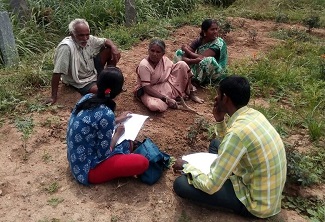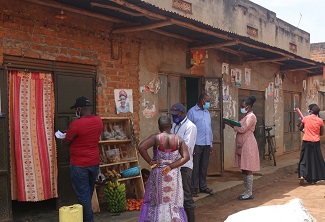
Photo courtesy of St. John's Medical College
Scientists in India are using supplemental funds
to analyze partner violence during the pandemic
lock-down.
Across the globe, an unintended consequence of COVID-19-related lockdowns has been an uptick in domestic violence. In India, roughly a third of married women experience intimate partner violence even during normal times, according to University of Iowa professor Dr. William Story.
When the pandemic began, Story’s colleagues, Dr. Nancy Angeline Gnanaselvam and Dr. Avita Johnson, were in the Bangalore suburbs collecting data on attitudes surrounding violence against women for a Fogarty-funded study. “We were able to interview women both before the COVID-19 lockdown and then after,” said Story. His supplemental grant from Fogarty will enable him to analyze this data and also re-interview some women given that initial trends were “curious.” “Intimate partner violence in some populations decreased after the lockdown, when we expected to see an increase,” he said.
Since many people moved during the pandemic, he noted, someone in an abusive relationship may have relocated away from their partner. With liquor stores and bars closed, alcohol consumption might have decreased. “It’s a complex pattern that we want to look into more deeply,” Story said.
Peri-urban neighborhoods—created by the settling of previously rural areas near cities—are appearing throughout Southeast Asia and in other regions. For this reason, Story believes his work will be applicable to settings beyond India. Story hopes his data will also inform his work developing an intervention for teens that addresses patterns of behavior around concepts of masculinity. The new funding will also support data analysis instruction for the research team at St. John’s Medical College in India.
“Supplements are great for being able to look at a question that maybe we weren’t expecting to come up during a study,” Story said. “COVID has put us in a position of asking extra questions and looking at things a little bit differently and I want to continue to practice that moving forward.”
Examining antibody response to SARS-CoV-2 in Sierra Leone
Sierra Leone has experienced much lower COVID-19 caseloads and much less disease severity than countries in other parts of Africa. Preliminary testing done on blood samples collected prior to the pandemic showed Sierra Leoneans had a higher antibody response to SARS-CoV-2, SARS-CoV, MERS and and other human coronavirus strains than their U.S. counterparts.
“One theory is that there may be other circulating coronaviruses in that part of the world that don’t necessarily cause disease—or severe disease—yet may be providing some level of protection,” said Vanderbilt University’s Dr. Troy Moon.
Vanderbilt and its partners at Tulane have been using a Fogarty grant to help build research capacity in Sierra Leone in the wake of the 2014-16 Ebola outbreak. With supplemental funding, Moon and his colleagues will expand on this preliminary data to determine the percentage of participants who are seropositive to different human coronaviruses, including SARS-CoV-2, both before and during the pandemic, but prior to vaccination. In addition the team will determine the proportion of positive-testing patients whose serum has neutralizing antibodies against SARS-CoV-2. Finally, the team will determine if this pre-existing immunity has any impact on the immune response in their cohort of participants following COVID-19 vaccination.
The onsite work will be led by Sierra Leonean investigator Dr. Robert Samuels, who recently trained at Vanderbilt as a scholar with support from the original Fogarty grant. Samuels will apply his newly acquired knowledge of research methods and management to lead and oversee the day-to-day implementation of the study, while gaining hands-on experience.
Moon believes this research could provide essential clues to further understand how coronaviruses operate. “I think it opens up many questions as we try to better understand our immune response and coexistence with different respiratory pathogens and how that affects us at different time points when we see different illnesses,” he noted. “This is now the third pathologic coronavirus epidemic we've seen and one that probably will be with us for a long time. This is not going to be the last time we hear from coronaviruses.”
Training researchers at Rakai

Photo by McKinda Jackie/Rakai Health Sciences Program
Fogarty grant supplements will suport an array of COVID-19
related activities such as mentored research training
in Rakai, Uganda.
The supplement, like its parent grant, aims to support locally relevant research. Planned activities include didactics and discussions, mentored research, online writing accountability groups, data science training and in-country mini-sabbaticals.
Advancing implementation science in Malaysia
Malaysia—spared in the earliest days of the pandemic—had the largest COVID-19 case load per capita by the spring of 2021. Concurrently, this Asia-Pacific nation is battling a rapidly expanding HIV epidemic. COVID-19 has been an “implementation disruptor,” stalling research and the prevention and treatment of HIV in Malaysia, noted Yale University’s Dr. Frederick Altice in his supplement proposal.
With the additional support, Altice and his colleague Dr. Adeeba Kamarulzaman will establish COVID-19- related trainings and activities through an existing implementation science training program. These will include a series of lectures on COVID-19 and an expansion of the summer bootcamp to address issues directly related to COVID-19. In addition, research funding will be provided so faculty members can conduct pilot projects focused on both COVID-19 and HIV.
The nation of 32.8 million people has more than 100,000 cumulative cases of HIV. Recent rapid growth is attributed to an inadequate scale-up of evidence-based interventions, including access to HIV testing, pre-exposure prophylaxis, antiretroviral therapy and syringe exchange programs.
Building biostatistical capacity in South Africa
COVID-19 disease, when combined with existing high rates of HIV/AIDS and tuberculosis, threatens fragile healthcare systems and infrastructures in sub-Saharan Africa. Policymakers require quality evidence to prevent and treat COVID-19. Instead, they face an “infodemic”—innumerable studies conducted across the globe, many of poor quality, plenty with contradictory findings, noted Dr. Taryn Young of Stellenbosch University.
With her supplementary grant, Young will develop training to support evidence synthesis and network meta-analysis to inform COVID-19 and HIV policy and practice decisions. Young’s team plans to increase capacity by developing an online course that instructs participants to find, appraise, interpret and consider the use of network meta-analysis and systematic reviews. The South African team will also develop a global network meta-analysis master class for researchers, decisionmakers and students in HIV/AIDS. This online workshop will build regional capacity and cultivate analysis and systematic review skills. “We are busy registering the short courses and developing content,” said Young, noting that the courses will be offered early in 2022.
Having seen the pandemic’s disruption of care delivery systems, she believes that the pandemic will likely reverse gains achieved over decades by HIV programs. Young’s supplementary project aligns with her parent grant, which aims to establish an Africa Center for Biostatistical Excellence. “There is an urgent need for data driven interventions to address these threats to African populations.”
Determining the mental health of Ugandan youth
Uganda responded to the COVID-19 pandemic with stern measures, including a lockdown, shelter-in-place requirements and school closures. This strict approach exposed youth living with HIV (YLHIV) and their families to a variety of stressors, including social isolation, anxiety, loneliness, difficulty accessing medications and disruptions in economic activities, explained Dr. Fred Ssewamala of Washington University in St. Louis. With supplementary support from Fogarty, he plans to examine the pandemic’s impact on the mental health of YLHIV in Uganda.
Ssewamala and his team will interview 500 YLHIV across 39 health facilities in the greater Masaka region of Southwestern Uganda. Prevalence of HIV and AIDS in this region is 8% compared to about 6% nationally. His primary aim is to gain a clearer understanding of “the intersectionality of the consequences of two viral infections at a physiological level: HIV and COVID-19,” he said. “We need to understand the psychological impact of the pandemic in real time in order to design appropriate measures to address any challenges.”
Ssewamala’s team anticipates seeing increased depression, anxiety and post-traumatic stress disorder in study participants. “We know that prior large-scale disasters—such as Ebola and SARS—had a negative impact on the psychological wellbeing of patients and healthcare providers,” he noted. “However, we have never witnessed such drastic control measures before.”
During the project, Ssewamala and his colleagues will be training and mentoring the cadre of 18 Ugandan scientists chosen under his original research training grant. Participants will learn “rigorous and culturally-congruent research methods,” he said. He hopes to exchange data and lessons learned with other Fogarty awardees and, eventually, plans to disseminate his findings among the broader scientific community. “The lessons are potentially transferable to other low-resource settings in sub-Saharan Africa.”
Understanding stigma in Nigeria
Nigeria has a high burden of HIV-related brain disorders, including mental health illnesses and neurological impair�ment. Dr. Babefemi O. Taiwo of Northwestern University in Chicago estimates that HIV-associated neurocognitive disorders alone affect many Nigerians living with HIV, but exact numbers are not known. Taiwo, supported by an award attached to his HIV Research training grant, will look at the intersection of COVID-19 and HIV amongst people living with HIV (PLHIV) in Nigeria. “We have a particular interest in how mental health issues have been impacted, which will include how stigma might have played into that.”
PLHIV historically bear a disproportionate share of mental health challenges caused by both the diagnosis itself and the environment, he explained. Pockets of stigma still exist in Nigeria—like in many parts of the world—and COVID-19 has added to this psychological burden. Meanwhile, the lockdown complicated pre-existing mental health issues and restricted access to treatment. “Testing for COVID-19 is not widespread and there is a lot of misinformation, fear and stigma,” Taiwo noted. “So what you have now is a confluence of mental health challenges from COVID-19 and HIV that, for PLHIV, can be quite significant.” This “entanglement” often leads to poor adherence to treatment, the cornerstone of success.
Ongoing research includes longitudinal data on depressive symptoms and HIV care adherence both before and after the onset of the pandemic, explained Dr. Bibilola Oladeji, Taiwo’s colleague who will lead the research team in Ibadan. “We want to leverage this data to explore the effects of the COVID-19 pandemic-related lockdowns and movement restrictions on depressive symptoms.” The team expects to gain a better understanding of how COVID-19 is impacting the mental health of PLHIV, which age groups are most affected and how to use that information to develop interventions.
Progress is underway. The team has selected trainees and brought together key stakeholders. Currently, they are developing lectures, courses and other educational experiences. Oladeji said, “Trainees will explore available data and develop qualitative data as part of their hands-on training and to fulfill the program’s capacity building activities.” Taiwo concluded, “This supplement will help nurture another group of investigators with an interest in the mental health and neurologic complications of HIV infection.”
More Information